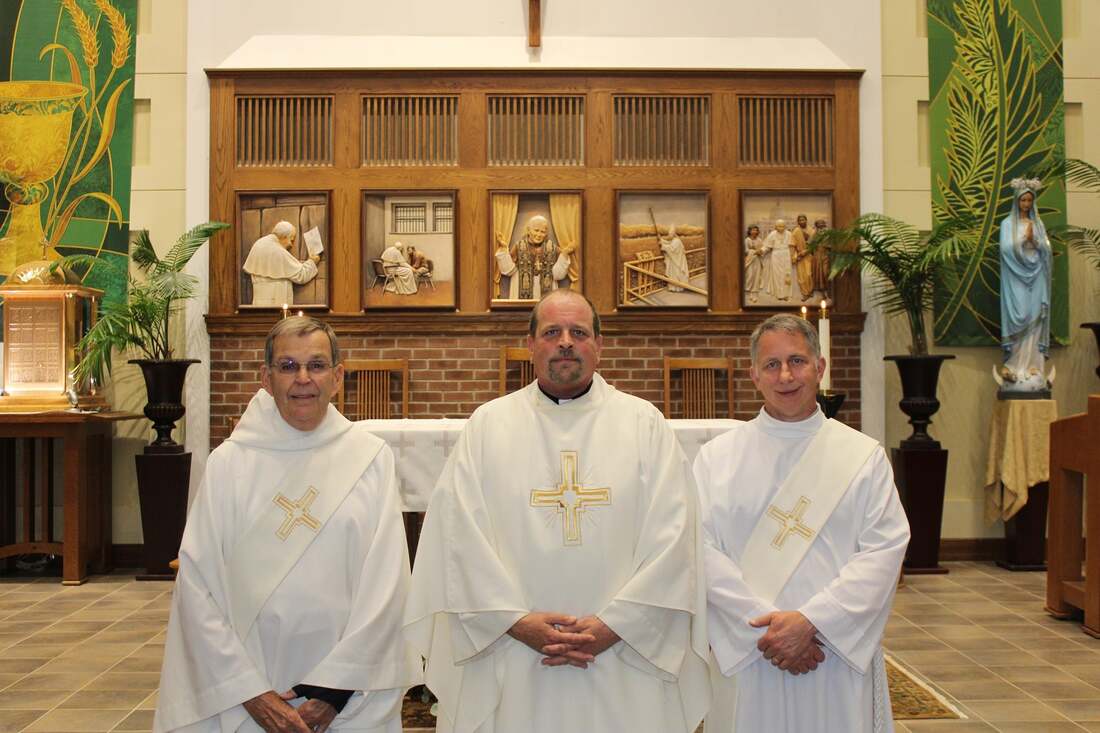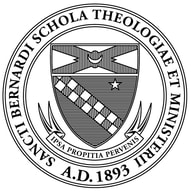Holy Orders
Priesthood
Who is a Catholic Priest?
A Roman Catholic priest is a man called by God to serve Christ and the Church through the reception of the sacrament of Holy Orders. As the Catechism of the Catholic Church states, the priest serves the faithful by building up and guiding the Church in the name of Christ, who is head of the body (CCC #1547). A priest makes a lifelong promise of celibacy and obedience to a bishop or religious superior.?
Who is a Diocesan Priest?
A diocesan priest is under the jurisdiction of a diocesan bishop and is generally assigned to minister within the boundaries of a particular parish in a particular diocese. A diocesan priest spends his time ministering to the people of his parish or his particular pastoral appointment through sacramental and pastoral ministry.
In this day and age why should I consider being a priest?
The ordained priesthood or the vowed religious priesthood is a wonderful life of dedication and service to the people of God. You are not paid a lot of money. You live a pretty simple life. The joys you experience, however, are beyond measure. As a priest you are with people during some of the most significant moments of their lives. You are there to baptize their children and give them first Holy Communion. You are a minister of God's mercy and forgiveness in the sacrament of Reconciliation. You are privileged to walk with young couples as they prepare for and celebrate the sacrament of Matrimony. You witness God's healing presence in the sacrament of the Anointing of the Sick. You have the opportunity to be with families who have lost a love one, and you celebrate the funeral Liturgy with and for them. These are wonderful sacramental moments when you can be present during the joyful, as well as sorrowful, moments in peoples' lives.?
What qualifications are needed to become a priest?
What qualifications are needed to become a priest? To become a priest one must have a sincere and genuine interest in serving Christ and the Church. The applicant to the Archdiocese must be an unmarried practicing Roman Catholic male at least 18 years of age. The application process usually begins upon the commencement or completion of an undergraduate degree.
What would a typical day in the life of a priest look like?
What would a typical day in the life of a priest look like? Well, to be frank, there is not a typical day in the life of a diocesan priest. Perhaps the only consistent aspect of any day in the priesthood is celebrating the Holy Eucharist and experiencing Jesus in those with whom the priest comes in contact. The needs of a parish family, hospital, etc. are so diverse that it's hard to predict how your day will go. That's part of the great joy in serving God as a diocesan priest.
Who is a Catholic Priest?
A Roman Catholic priest is a man called by God to serve Christ and the Church through the reception of the sacrament of Holy Orders. As the Catechism of the Catholic Church states, the priest serves the faithful by building up and guiding the Church in the name of Christ, who is head of the body (CCC #1547). A priest makes a lifelong promise of celibacy and obedience to a bishop or religious superior.?
Who is a Diocesan Priest?
A diocesan priest is under the jurisdiction of a diocesan bishop and is generally assigned to minister within the boundaries of a particular parish in a particular diocese. A diocesan priest spends his time ministering to the people of his parish or his particular pastoral appointment through sacramental and pastoral ministry.
In this day and age why should I consider being a priest?
The ordained priesthood or the vowed religious priesthood is a wonderful life of dedication and service to the people of God. You are not paid a lot of money. You live a pretty simple life. The joys you experience, however, are beyond measure. As a priest you are with people during some of the most significant moments of their lives. You are there to baptize their children and give them first Holy Communion. You are a minister of God's mercy and forgiveness in the sacrament of Reconciliation. You are privileged to walk with young couples as they prepare for and celebrate the sacrament of Matrimony. You witness God's healing presence in the sacrament of the Anointing of the Sick. You have the opportunity to be with families who have lost a love one, and you celebrate the funeral Liturgy with and for them. These are wonderful sacramental moments when you can be present during the joyful, as well as sorrowful, moments in peoples' lives.?
What qualifications are needed to become a priest?
What qualifications are needed to become a priest? To become a priest one must have a sincere and genuine interest in serving Christ and the Church. The applicant to the Archdiocese must be an unmarried practicing Roman Catholic male at least 18 years of age. The application process usually begins upon the commencement or completion of an undergraduate degree.
What would a typical day in the life of a priest look like?
What would a typical day in the life of a priest look like? Well, to be frank, there is not a typical day in the life of a diocesan priest. Perhaps the only consistent aspect of any day in the priesthood is celebrating the Holy Eucharist and experiencing Jesus in those with whom the priest comes in contact. The needs of a parish family, hospital, etc. are so diverse that it's hard to predict how your day will go. That's part of the great joy in serving God as a diocesan priest.
Permanent Diaconate
Ministry of the Word
The deacon participates as an evangelizer and teacher in the Church’s mission of heralding the word. In the Liturgy of the Word, especially in the Eucharist or in those liturgies where he is the presiding minister, the deacon proclaims the Gospel. Other forms of his function in the Church’s ministry of the word include catechetical instruction, formation of candidates preparing for the sacraments, leadership roles in retreats and renewal programs and outreach to alienated Catholics.
Ministry of Liturgy
In the celebration of the Eucharistic Liturgy, the deacon participates in specific penitential rites, proclaims the Gospel, may preach the homily in accord with the provisions of Canon Law and voices the needs of the people in the General Intercessions. He assists the presider in accepting the offerings of the people and helps to prepare the gifts for sacrifice. He may extend the invitation of peace, serve as an ordinary minister of communion and finally he dismisses the community at the end of the liturgy. Other liturgical roles include those of solemnly baptizing infants, witnessing marriages, bringing Viaticum to the dying and presiding over funeral rites. He may officiate at exposition, benediction of the Blessed Sacrament, conduct public rites of blessing and administer the Church’s Sacramentals as designated in the Book of Blessings.
Ministry of Charity
The deacon’s ministry of Word and Liturgy would be severely deficient, if it were not accompanied by his exemplary witness and assistance in the Church’s ministry of Charity and Justice. Thus, Pope John Paul II affirms both: “This is at the very heart of the diaconate to which you have been called: to be a servant of your brothers and sisters.” Thus we see the deacon ministering in hospitals, nursing homes, prisons, soup kitchens and being of service to his fellow workers and, of course, his family. In a world hungry and thirsty for convincing signs of the compassion and liberating love of God, the deacon makes the mission of the Church visible in his words and deeds, responding to the master’s command of service and providing real-life examples of how to carry it out.
Ministry of the Word
The deacon participates as an evangelizer and teacher in the Church’s mission of heralding the word. In the Liturgy of the Word, especially in the Eucharist or in those liturgies where he is the presiding minister, the deacon proclaims the Gospel. Other forms of his function in the Church’s ministry of the word include catechetical instruction, formation of candidates preparing for the sacraments, leadership roles in retreats and renewal programs and outreach to alienated Catholics.
Ministry of Liturgy
In the celebration of the Eucharistic Liturgy, the deacon participates in specific penitential rites, proclaims the Gospel, may preach the homily in accord with the provisions of Canon Law and voices the needs of the people in the General Intercessions. He assists the presider in accepting the offerings of the people and helps to prepare the gifts for sacrifice. He may extend the invitation of peace, serve as an ordinary minister of communion and finally he dismisses the community at the end of the liturgy. Other liturgical roles include those of solemnly baptizing infants, witnessing marriages, bringing Viaticum to the dying and presiding over funeral rites. He may officiate at exposition, benediction of the Blessed Sacrament, conduct public rites of blessing and administer the Church’s Sacramentals as designated in the Book of Blessings.
Ministry of Charity
The deacon’s ministry of Word and Liturgy would be severely deficient, if it were not accompanied by his exemplary witness and assistance in the Church’s ministry of Charity and Justice. Thus, Pope John Paul II affirms both: “This is at the very heart of the diaconate to which you have been called: to be a servant of your brothers and sisters.” Thus we see the deacon ministering in hospitals, nursing homes, prisons, soup kitchens and being of service to his fellow workers and, of course, his family. In a world hungry and thirsty for convincing signs of the compassion and liberating love of God, the deacon makes the mission of the Church visible in his words and deeds, responding to the master’s command of service and providing real-life examples of how to carry it out.


